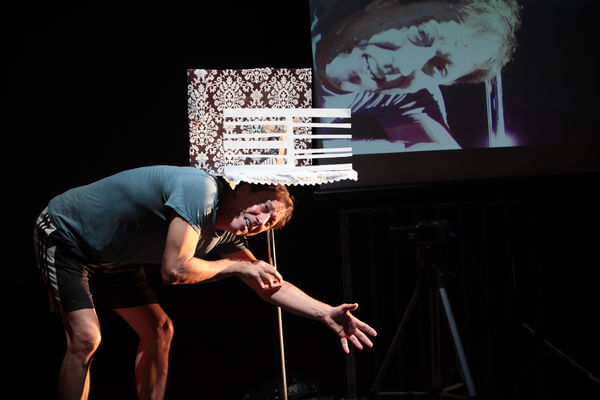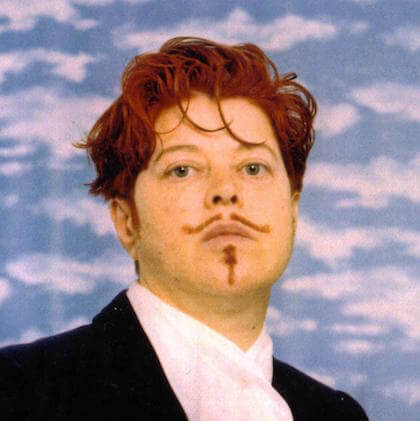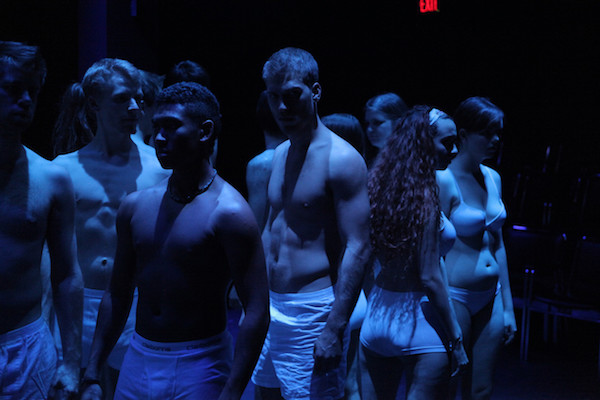A live feed of John Fleck’s face on the monitor, from a performance of “Blacktop Highway” at REDCAT in Los Angeles. | RAFAEL HERNANDEZ
BY SCOTT STIFFLER | Halloween may be over, but that’s no reason to pass up the opportunity to grip your ticket and enter the creepy old house at Dixon Place that John Fleck has stocked to the hilt with death, dread, grief, greed, sex, secrets, and lye (and, also, lies).
“I like to scare and shock people,” said Fleck, the defunded-circa-1990 “NEA Four” performance artist and, later, busy TV actor, whose new multi-character solo show, “Blacktop Highway,” lingers on the palate like a sweet confection laced with something bitter, possibly toxic, that you can’t quite put your finger on.
Nominally the story of an upscale stranger with car trouble who stumbles upon a taxidermy-filled estate occupied by brother Frank, sister Jane, and a caged creature of dubious parentage, “Blacktop” unfolds as the manic, humorously self-aware live presentation of a screenplay whose constant revisions serve to amp up the drama — and, at times, appeal to the vanity of its writer/ performer (“a man in his mid to late 50s” becomes “a non-smoking very attractive man in his early to mid-30s, his lush head of hair blowing in the wind from an open car window; a man steering his own course.”).
NEA Four artist travels “Blacktop Highway” back to his live theater roots
Grim and goofy, disarming and disturbing, it’s informed as much by familiar Hollywood set pieces and plot twists as Fleck’s knack for hurling kitschy, misty, emotionally complex satire at interpersonal relations, religion, and the raw power of repressed sexual energy.
But wait, why gothic horror as the vehicle? It’s hardly an obvious choice for the man whose autobiographical and absurdist theatrical endeavors include “Nothin’ Beats Pussy,” “Psycho Opera,” and “I got the He-Be-She-Be’s.” To be fair, though Fleck has made his mark in the sci-fi genre, having appeared in “Babylon 5” and several incarnations of the “Star Trek” franchise.
“I always loved horror,” Fleck insisted. “I had this thing about ‘The Werewolf’ — I liked to pretend I was ‘The Werewolf,’ and I remember, as a kid, we’d play ‘Godzilla’ in the driveway.”
It’s interesting to note, then, that a destructive monster looms large throughout “Blacktop Highway,” as does a gravel-filled, 50-foot stretch of driveway that leads from the titular strip of slickened road to the house where doom awaits.
“I kind of grew up in a somewhat dysfunctional family,” Fleck explained, “so you act out things to get it out of your psyche when you can’t share it in the family.”
Don’t project too much onto that. An undercurrent of autobiography is standard issue in any creative endeavor — but here, Fleck combines what may or may not be his own secret shames with a movie junkie’s fondness for tropes and an anthropologist’s fascination with the crave/ recoil response when confronted with facts that are probably fiction. Lest you think you’re being lectured to (apart from the point where there’s an actual lecture), Fleck heaps upon this foundation thick layers of sight gags, physical comedy, puppetry, virtuoso vocal and facial contortions, and video projections that turn the black box theater into a cinema where the watcher becomes the watched (the screenplay direction “Cut to the attractive man’s POV” is this show’s breakout drinking game phrase).
“Here’s the thing,” Fleck confessed, “it’s not the greatest horror story. It’s based on old clichéd scenarios. The deconstruction is what interests me” — and not just in reference to the spook house genre he both respects and subverts.
“Observation affects behavior,” says Fleck, in the guise of the smug “Blacktop” professor-type who interrupts the action to name-drop the late French philosopher Jean Baudrillard’s 1981 “Simulacra and Simulation” treatise, insisting that from this moment on, our man Fleck is “very aware that he is being watched” and, in our own awareness of that fact, audience members become “the überwatchers.”
“We live in a hyper-real world where there’s no longer a difference between reality and the appearance of reality,” said Fleck of the show’s Baudrillard-inspired, ever-peeling layers of revelations and shifting perspectives. “People want to know, ‘Is this all fiction?’ But in a way, I could look at all these characters that came out of my psyche as a mirror aspect of myself; this quest for the pretty face, and me being an aging gay man; the quest to stay young instead of accepting the reality of wanting to change that.”
This is just one of the deep insecurities we’re prodded/ tempted/ encouraged to project onto Fleck, who at one point turns to the audience and quips, “I’m too old to get a job in Hollywood, so I made my own [movie] and play all the parts.”
Fleck admitted his bitter little Norma Desmond/ Baby Jane routine is “somewhat exaggerated, as we in the theater tend to do,” although work on the small screen has dried up since a long stretch of steady work in episodic and procedural dramas: Check out his IMDb profile for a multitude of unsavory characters, including “Gravedigger,” “CEO,” and, yes, “Wolf.”
But Fleck isn’t disavowing or dissing the dues paid through such steady work. After all, he noted, “I squirreled away enough bucks when I was working in that medium, and now I’m at a point in my life [where] I don’t need to hustle for the TV jobs and am instead focusing on my performance art and theater. I did a feature film with Margaret Cho called ‘Alaska Is a Drag.’ I just finished acting in a David Greenspan play in LA called ‘Go Back to Where You Are,’ and I’m planning on doing a Pinter play in the spring. I want to be ‘live.’”
This renewed dedication to theater, it turns out, is steeped in irony. Fleck credits the creation of “Blacktop” to an Internet project that never saw the light of day.
“I have this old crone in me,” he said regarding what would become the character of long-suffering sister Jane “that I got in touch with when I did [Lady Enid in Charles Ludlam’s] ‘The Mystery of Irma Vep,’ so it just kind of evolved. I originally thought about this piece as a web series. I was gonna call it ‘The Door.’ This old woman would answer the door, and there’s a big secret inside.”
Readers are strongly advised to enter the doors of Dixon Place, and discover that secret for themselves. Your time will be duly rewarded, promised the man whose downtown theater credits date back to the early ’80s and include the “Blacktop” host venue as well as PS122 and La MaMa. “I think the power of live theater,” Fleck insisted, will trump the experience of sitting at home “just looking at a screen. I want something to make me feel like I’m a fucking human being, not a robotized media head.”
Let’s hope that message reaches the masses — or at least the guy who recently asked Fleck what he was up to next.
“I said I was going to New York City to do my solo show,” Fleck recalled, “and he asked, ‘Why?’ and I said, ‘Well, that’s what I am. I’m a performance artist/ theater person.’ And he said no one he knows ‘goes to live theater anymore.’ And I said, ‘Well, if that’s the case, then this an act of defiance and rebellion on my part.’ I truly feel theater, at its core, is about reminding us of our shared humanity — and it has to be ‘live.’”
Randee Trabitz directs, with video design by Heather Fipps, costume design by Christina Wright, puppet design by Christine Papalexis, and original lighting design by Anne Militello.
JOHN FLECK | “Blacktop Highway” | Dixon Place, 161A Chrystie St., btwn. Rivington & Delancey Sts. | Nov. 11-12, 18-19 at 7:30 p.m. | $18, $15 for students & seniors at dixonplace.org or 212-219-0736






































